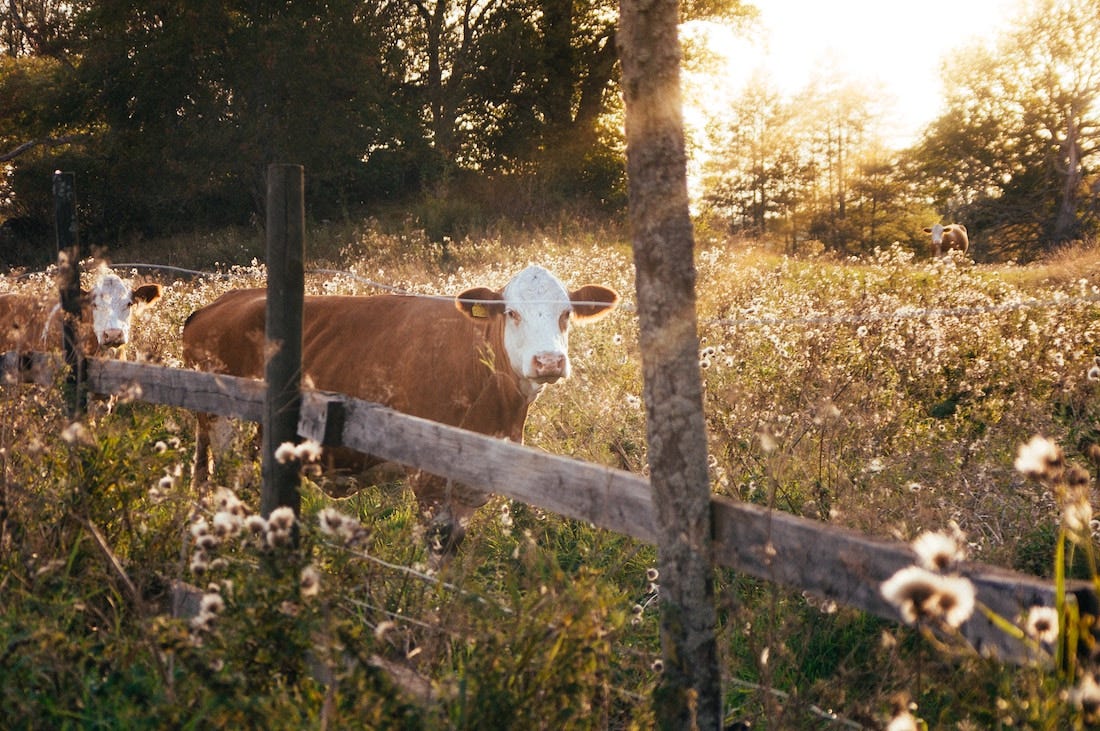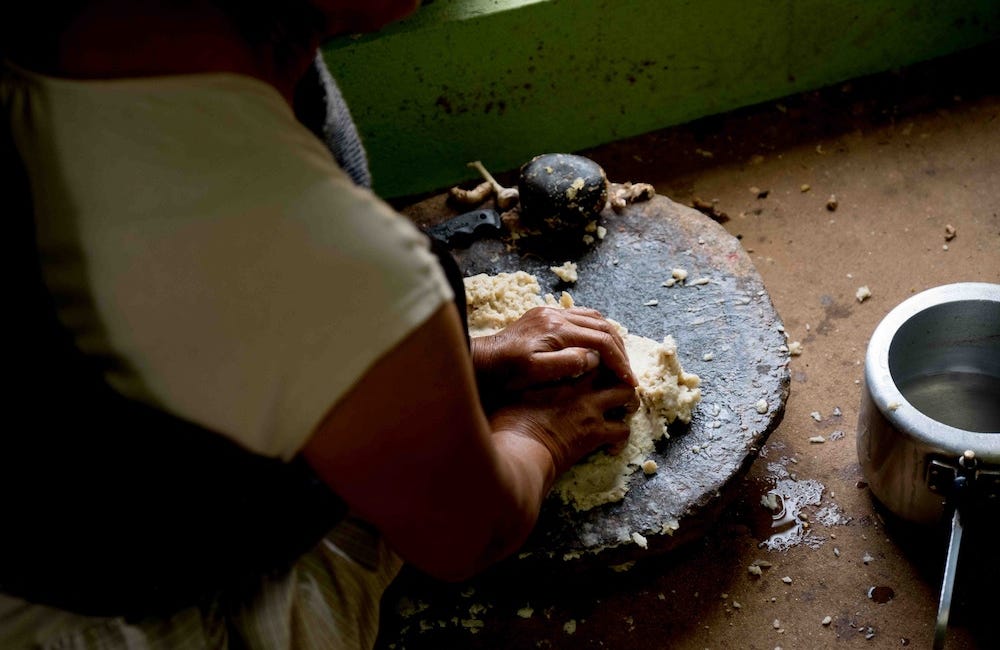Can't stop thinking about ... Ballerina Farm
What the obsessive critique of Hannah Neeleman and her family tells us about ourselves

At the beginning of summer, I pledged to start sending timelier, faster essays about some corner of the internet that I can’t stop thinking about. I then proceeded to overthink about today’s topic for weeks and weeks, trying to find the right way in, wondering if I should write it at all.
The topic, of course, is Ballerina Farm, the Instagram influencer who possesses a life so bucolic and idealized that many writers in my particular identity group — white, left-of-center women who write on Substack, and are usually moms — apparently can’t stop thinking about her either.
For the uninitiated, Ballerina Farm is Hannah Neeleman, a mom of seven who is a Juilliard-trained ballerina. Her family are followers of the Church of Jesus Christ of Latter Day Saints (formerly referred to as Mormon) and her husband is reportedly the beneficiary of some generational wealth linked to the airline Jet Blue, though details are vague. They live on a farm in Kamas, Utah, where Hannah joyfully shares their life on Instagram alongside promoting their e-commerce business of sundry farm products.
Her content is exactly what you’d imagine: well-lit, nostalgic, pastoral. It’s full of linen aprons and dappled sunlight and copper kitchenware you can buy alongside their pasture-raised meat boxes and frozen sourdough chocolate chip cookies.
Neeleman, who is naturally pretty and blonde, is also a beauty pageant participant. This corner of the internet lost its mind once again recently when, in between milking dairy cows and home-schooling her children, she managed to win the “Mrs. American” pageant representing South Dakota. (The fact that she does not live in South Dakota, but rather Utah, and that Mrs. American is different from Mrs. America which is different from Miss America, are all fascinating digressions into beauty pageantry that we don’t have time to get into here.) On the back of this win, a video clip of her pageant speech where she names giving birth as “the most empowering feeling I have ever felt” went viral. It was swiftly politicized by right wingers who prefer all women stay home and have many children.
Interestingly, my obsession isn’t really about Ballerina Farm or Hannah herself — honestly, she seems nice and like a really good mom. I enjoy her content and I’d happily be her friend. My issue is with the mushroom cloud of discourse that surrounds her. It seems to suggest that to enjoy her content or get some value from following her life is to be hoodwinked into following some regressive conservative conspiracy. In theory, I should agree with it. But for months now, I’ve been trying to figure out why I don’t.
Much of the writing about Ballerina Farm casts her as a tradwife, which is internet speak for (usually) white christian stay-at-home moms and housewives who favor a regression to pre-feminism norms of pleasing your husband and raising many children. Tradwife is a term that’s never neutral: It’s either used pejoratively — by the left to dismiss regressive conservative gender politics — or proudly, by actual tradwife influencers encouraging women to quit their jobs and embrace the domestic arts. Neeleman, for her part, posts content that is studiously apolitical and doesn’t use the term at all.
Ballerina Farm discourse also tends to bear the ironic, knowing, and frankly kind of obnoxious tone that coastal lefty journalists use when writing about anything that’s not coastal and lefty. There is a lack of curiosity, an assumption of knowing everything about her interior life and motivations that really rankles me. I find it particularly notable that, with the exception of this 2021 WSJ piece about farm influencers, I can’t find a single article that has attempted to interview Neeleman herself.*
For the avoidance of doubt, please allow me to say: I literally cannot imagine anything worse than having seven children, let alone ones that I can’t send out the door to school everyday. Far from being a tradwife, I insisted that my child get my last name because I did all the physical labor of getting him here. Furthermore, I went back to work four months after giving birth not only because I needed money, but also because I was pretty bored. And yet despite all that, there is a quality to Neeleman’s life that I’m drawn to, and that I would argue all the commentariat who writes about and criticizes her content is too.
There are also some widely-circulated critiques that I think are valid. Namely, where is the help? The laws of time and space dictate that it is simply not possible to achieve everything Neeleman appears to get done every day: animal-related chores, cooking elaborate meals from ingredients she grew or raised, homeschooling, breastfeeding, cleaning all those cast iron pans, content creating, dealing with the pageantry of it all, and preventing small children from their various brushes with death. This woman simply has to have domestic help other than her cheerful, cowboy-hat wearing husband, but you rarely (if ever) see it depicted on her account.
But some of the other critiques fall very flat to me. I don’t buy that the lifestyle Neeleman depicts is regressive or a fantasy. Sure, it’s a privileged lifestyle choice that she has very consciously made and invested heavily in. And yes, she is presenting an idealized version of her farm life that appears very likely to be backed by some generational wealth — in addition to all the literal hard work you see her doing on her Stories. But I don’t think that makes her different from literally any other influencer or content creator on Instagram. There is truly nothing newsworthy to me about a privileged person portraying an idealized life on Instagram.
Then there’s the politics of it all. I think an account that is religious or conservative — without being hateful or racist — and yet still manages to be interesting to people who are not members of those identity categories is a good thing. Though many of us have forgotten how to do this, it’s still possible to not reflexively label people who don’t share your particular worldview as “problematic.” In fact, we should all try to do that more.
Furthermore, I feel very confident that Neeleman chose this life, that it is not one borne out of oppression or force by her rich husband. Yes, she is very publicly performing a version of femininity that is out of step with progressive norms and may make many uncomfortable. But as far as I know, that’s part of the deal of being a feminist. It means women should have the agency to choose paths that you personally might not choose for yourself, from the childfree C-suite to the farm crawling with children. Like really, can we just let the woman live?
Those are all surface level impressions, though. It wasn’t until my recent interview with Katy Bowman that I realized what had been missing in all the Ballerina Farm discourse. I think our collective obsession owes in large part to the fact that, on some level, living closer to the land appeals to a deep place within all of us too. And at the core of all the Ballerina Farm discourse seems to lie mistaken belief that doing so is somehow conservative, Christian, or has a political ideology at all.
Elemental behaviors with Katy Bowman
This Q&A is part of a series of conversations with people who are forging meaningful lives in a time of chaos and unpredictability. They take time and skill to produce, but I keep them available to all subscribers rather than paywalling them. If you value the themes explored in these conversations, consider upgrading to a paid subscription.
Neeleman and her family depict a lot of what Katy and I called “elemental behaviors'' in our interview. The types of habits, movements, chores, and rituals that all humans, regardless of their identity group, crave and benefit from. Whether it’s baking bread, spending a lot of time outside barefoot, living alongside animals, or teaching your children how to do farm and household chores instead of shuttling them to competitive sports and piano practice. By the standards of human history, these are not markers of tradwife life, but rather the kinds of things that humans have always done to survive, yes, but also to thrive.
Neeleman’s pioneer women ancestors probably struggled and suffered and perhaps would have done anything to live the comfortable life of a modern millennial woman like me. But that modern millennial life — devoid of labor and full of convenience — is failing to meet our deep human needs in quite stark ways. In Neeleman, it is inspiring and refreshing to see a woman who has used her various forms of privilege to live in a very different way. A way that appears joyful and hard, messy and beautiful, idealized but also probably very full of animal and baby feces too.
We can’t all buy farms in Utah with undisclosed amounts of airline money, but that doesn’t change the fact that there are elemental behaviors that we crave, we need, and should find more ways to work into our lives. Choosing to spend more time engaging with the seasons, the place you live, and the land that you live on is not regressive, politically charged, or a harmful fantasy. It’s an expression of a deeply human need. Ballerina Farm’s world is just one version of doing it. I’m happy to follow along.
[*Of course, it’s possible I’m wrong here. Please send me a link to a piece that’s interviewed her and I’ll correct the post version of this. But typically, if a writer/journalist has reached out to a subject for an interview or comment, and that subject declined to participate, the writer will state that in the piece. This disclosure is good journalistic practice and shows that the writer did their reporting homework. I’ve never seen such a disclosure in the thousands of words of critique I’ve read about Ballerina Farm — including from writers who’ve written about her multiple times.]
Thanks for reading. If you enjoy this newsletter, it helps a surprising amount if you forward it to a friend or two, or leave a like or comment below. If you’d like to support me further, you can update your subscription to paid here (and get 50% off an annual subscription for the rest of the month) And if you’re already a paying subscriber, my deepest thanks for giving me the time and space to explore these themes. It means a lot.







YES 🙌
“But as far as I know, that’s part of the deal of being a feminist. It means women should have the agency to choose paths that you personally might not choose for yourself”
No Instagram. No Twitter or Facebook either. I can relate to all of this, Rosie, by sharing my delight in walking outside every day and soaking in nature, in all of its awe. Sometimes I add an hour to this step away from the screen walk by finding a favorite tree and reading one of my books by Henry Thoreau, who showed us nature is the source of all inspiration.